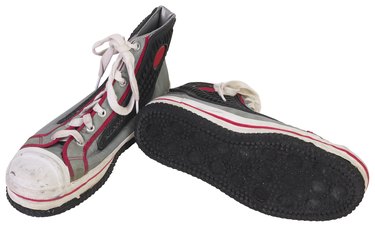
Candida albicans can cause a myriad of problems -- oral thrush, canker sores, skin rashes and even athlete's foot. Bacteria such as candida can thrive in dark moist areas such as locker rooms and inside your shoes. A combination of dietary changes and conventional antifungal medication should treat your current infection. Replenishing beneficial bacteria that can keep candida in check should prevent future outbreaks.
Candida
Video of the Day
Candida is a yeastlike fungus -- a type of bacteria -- and one of thousands in and on your body. Although normally harmless, if candida is allowed to reproduce too quickly, you may experience skin rashes, jock itch, a vaginal yeast infection, oral thrush or canker sores, in addition to athlete's foot. Candida feed on sugar; when changing your diet to fight athlete's foot, you must eliminate as much sugar as possible -- including foods that quickly turn to sugar such as foods made from refined flour. Foods that contain yeast, mold or fungus should also be avoided.
Video of the Day
Athlete's Foot
One of many ways that a candida overgrowth can manifest, athlete's foot is characterized by scaly, dry patches between your toes, sometimes with itching. You may think that you have excessively dry skin -- but that flaky skin is most likely athlete's foot. You may even see some small blisters. If the skin between your toes cracks, it can possibly let the bacteria penetrate deeper into your body and cause a secondary infection. Although dietary changes won't cure athlete's foot, they can help prevent future infections.
Candida Diet
Eliminate as much sugar from your diet as possible -- candida thrive on sugar. This includes both added sugars, in foods such as sodas, cookies, cakes and many processed snack foods and natural sugars as well. Limit your fruit consumption and choose low-sugar fruits such as apples and berries. Avoid bananas and other tropical fruits and fruit juices that are concentrated sources of sugars. Dairy should also be limited, with the exception of fermented dairy products such as yogurt and kefir, which contain beneficial bacteria -- a specific probiotic strain Lactobacillus acidophilus -- that help keep candida in check.
Other Treatment
You may need an over-the-counter antifungal medication to help treat your current infection. Because moisture encourages candida growth, make sure to dry your feet completely after showering. Do not wear cotton socks, but wear a synthetic fabric that will wick moisture away from your feet. Change socks often and use antifungal powder in your socks and shoes. Persistent or chronic infections may need stronger, prescription medications or could be a symptom of an underlying medical issue.
Is this an emergency? If you are experiencing serious medical symptoms, please see the National Library of Medicine’s list of signs you need emergency medical attention or call 911.